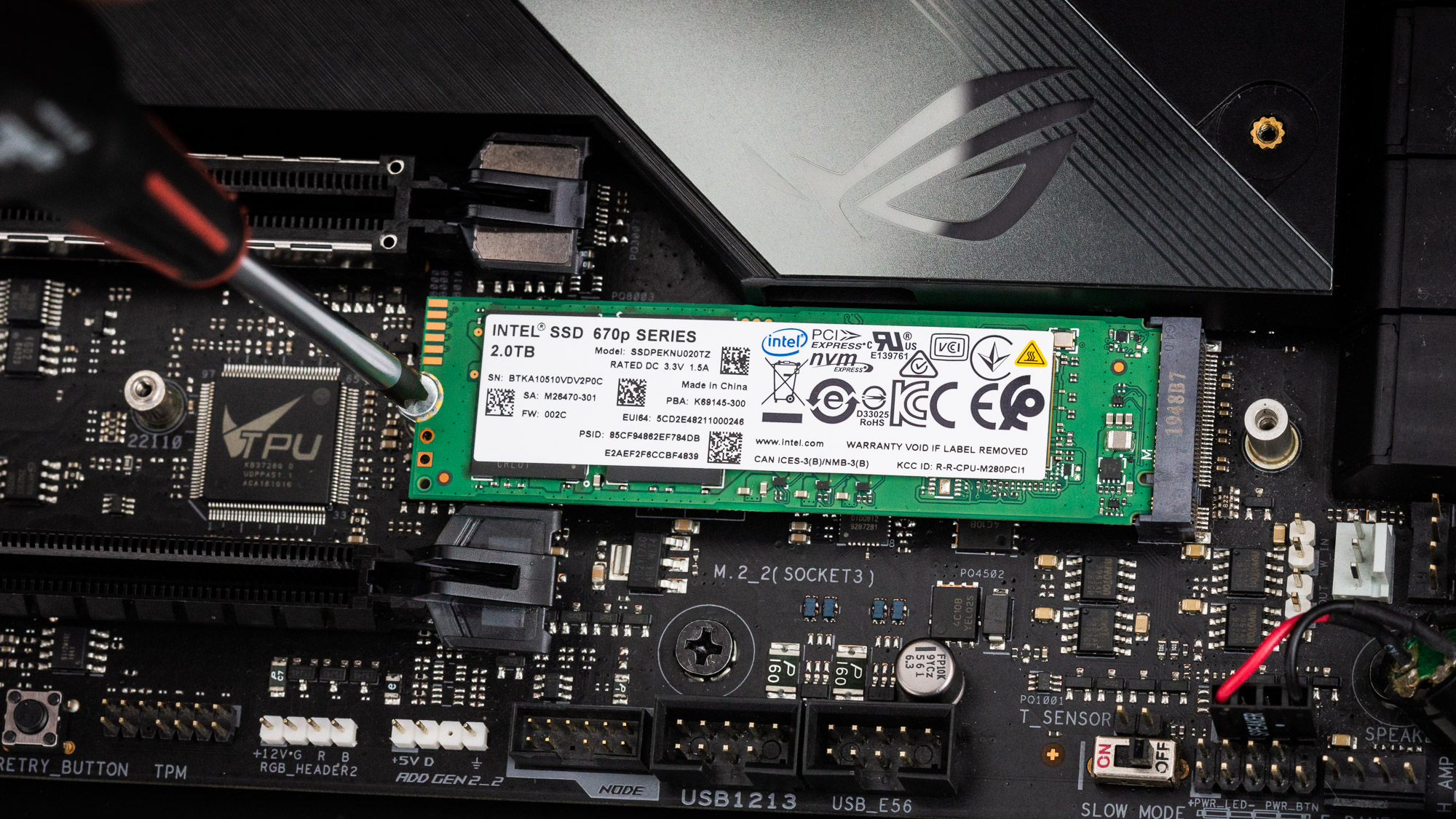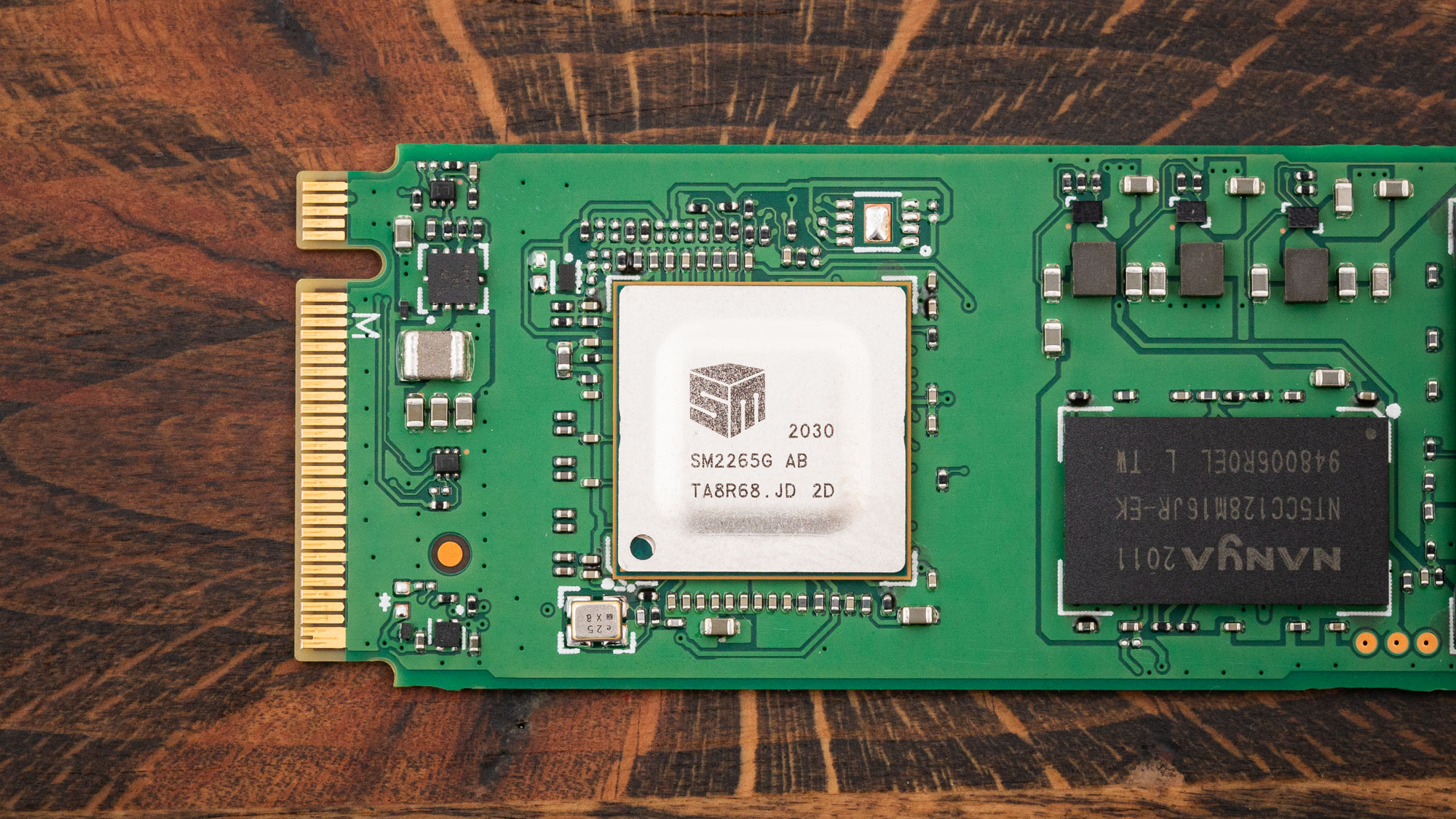Why you can trust Tom's Hardware
From a performance standpoint, Intel hit a home run with the SSD 670p. Intel’s SSD 670p is one of the fastest PCIe 3.0 x4 consumer SSDs we’ve laid our hands on, a surprising statement given its seemingly low-end hardware specs. Like SK hynix’s Gold P31 and Adata’s XPG Gammix S50 Lite, the Intel SSD 670p leans heavily on an efficient four-channel NVMe controller and fast flash speeds, but does so with high-density 144-Layer QLC flash rather than TLC.
As seen throughout our testing, the SSD 670p is very responsive and handles typical desktop PC workloads without getting hot. The Adata XPG Gammix S50 Lite offers slightly faster random read performance and has fairly similar write performance, but the 670p shines in mixed workloads due to tight tuning for these challenging types of workloads. That tuning grants the 670p all-around solid performance and efficiency, as well as some of the most responsive PCMark 10 application results we have seen, taking a close second to the Samsung 980 Pro. The 670p only begins to slow when we bombard it with sustained write workloads, but fortunately, the cache recovers very quickly.
If you’re looking for a solid NVMe SSD, Intel’s 670p is a good choice. However, the Intel 670p fetches quite a premium price at its launch MSRPs, aligning closely with Samsung’s 970 EVO Plus. We appreciate the SSD 670p’s burst performance, slim single-sided M.2 form factor, and AES 256-bit encryption support, but not the lower-than-average sustained write speeds and endurance figures.
Of course, if money's no object, the WD Black SN850 or Samsung 980 Pro are top considerations. But if you’re pinching pennies, Adata’s XPG Gammix S50 Lite offers a much more compelling value with higher endurance, slightly higher sequential performance, a heatsink, and that's not to mention a much cheaper price point. At the time of publishing, the 2TB Adata XPG Gammix S50 Lite is just $230, roughly $100 cheaper than Intel’s asking price at 2TB. Sabrent’s Rocket Q also offers tough competition and is even cheaper, though it’s not quite as fast.
MORE: Best SSDs
MORE: How We Test HDDs And SSDs
MORE: All SSD Content
Get Tom's Hardware's best news and in-depth reviews, straight to your inbox.

Sean is a Contributing Editor at Tom’s Hardware US, covering storage hardware.
-
mdd1963 In light of the Z590 being pretty darn imminent, you'd think Intel would have been releasing a PCI-e 4.0 drive about now....(vice merely catching up with the performance numbers of Samsung's 5 year old 950 Pro....)Reply -
RyzenNoob Not even faster than my ADATA drive, so hardly going to feature in possible upgrades in the futureReply -
anonymousdude The good is that it's improved QLC which is cool for entry level NVMe drives. The bad is that pricing that decidedly makes it not entry level. It costs more than the best PCI-e 3.0 drives and is QLC. There's no reason to get this drive when you can get for less. We'll have to let the dust settle and see where the actual market price ends up at. If it gets close to 660p pricing then it might be worth some consideration.Reply -
g-unit1111 I've bought several 660P drives, the price / performance ratio is usually one of the better ones in this segment. I would buy this one if the price drops to 660P levels.Reply -
Glock24 Has there ever been a QLC drive priced decently? I've never seen one. Even if there was I would not risk it.Reply -
USAFRet Reply
I got my 1TB 660p for $88, 18 months ago.Glock24 said:Has there ever been a QLC drive priced decently? I've never seen one. Even if there was I would not risk it.
So yes, there are. -
cyrusfox Reply
I picked up the 665p 1tb for $90 3 months back as well.Glock24 said:Has there ever been a QLC drive priced decently? I've never seen one. Even if there was I would not risk it.
Also second hand market from all the people upgrading their laptop and selling these, should be great.
Intel SSDs are quite ubiquitous. For instance my Ryzen 4700U HP laptop came with both an intel SSD 660p, as well as a wifi card AX200.
I think OEM will likely be 99% of the market for this drive. Glad Intel achieved more performance and endurance with the new controller. Also happy to see further innovation on the QLC front. REeally wonder who is going to achieve PLC first now.

